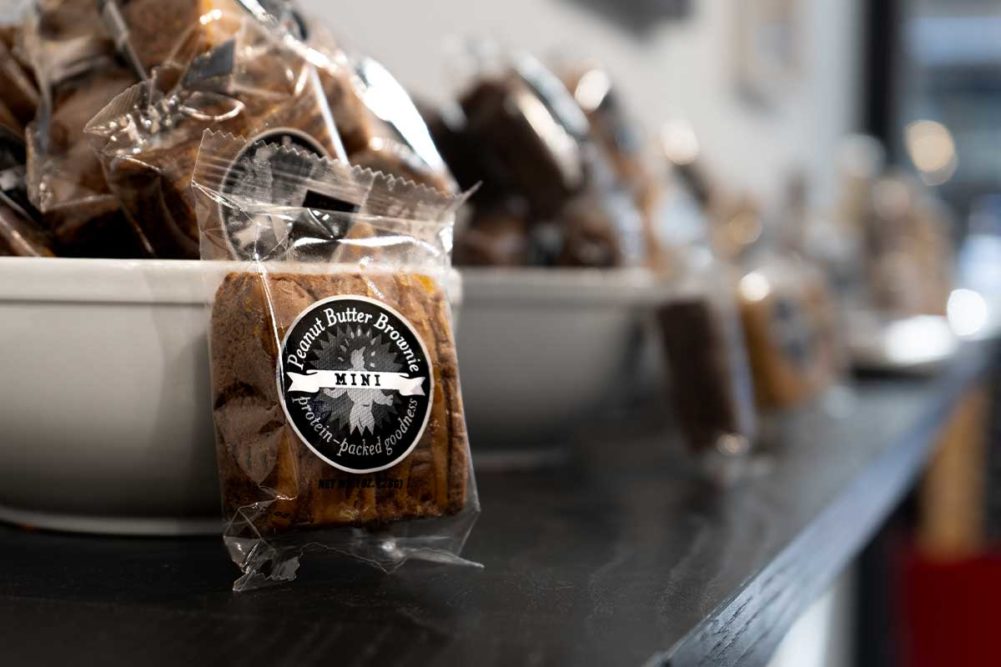Stephen Charles Lincoln, creator of New York City’s The Protein Bakery, believes that everyone deserves a cookie, just one that’s a little healthier for them than most. That’s why he makes whey protein concentrate — a high-quality, complete protein known for its muscle-building properties — the star of his products, which include blondies, brownies and cookies.
“Protein makes you feel fuller faster and prevents spikes in blood-sugar levels,” Mr. Lincoln said. “It’s a sure way to keep the heartbeat steady and the body in balance.”
Proteins also provide functionality to baked goods. The goal is to achieve that perfect balance between nutrition and function and still deliver on taste, texture and shelf life.
“Many proteins can provide excellent benefits in baked goods, like structure, gelation, increased browning, loaf volume, improved moistness and texture,” said Jason Demmerly, senior director, research and development, Glanbia Nutritionals.
Marketing nutrient density
For a growing number of consumers, smart snacks translate to those higher in protein and lower in added sugars. In fact, protein is the No. 1 nutrient Americans said they are seeking to consume, according to the 2023 Food and Health Survey from the International Food Information Council, Washington, DC.
Bakers looking to attract these shoppers are including all types of proteins in new product development, often combining a variety of plant and animal sources that deliver the highest protein content possible without sacrificing quality.
“I chose the name Protein Bakery for a good and healthy reason,” Mr. Lincoln said of his bakery, founded in 1999. “It’s to emphasize our unique muscle-building whey protein concentrate that is richer, better-tasting and a huge component in all our baked goods.”
Indeed, dairy proteins are high-quality, complete proteins, meaning they contain the necessary amounts of all the essential amino acids required by the human body to function at its best.
Eggs are another complete source of protein that are clean label, nutrious and are in the refrigerator of nearly every home in the United States, said Elisa Maloberti, manager of special projects and food safety with the American Egg Board. She also stressed how multifunctional eggs are in baked goods.
“If you take eggs out, then you have to replace them with other ingredients and sometimes with multiple ingredients,” she said.
Eggs offer many attributes to baked foods including flavor, color, emulsification, binding, crumb structure and more. However, if bakers want to really increase the level of protein in products, they would likely need to turn to other proteins.
“In many cases, you would add other sources of protein to that product,” said Nelson Serrano-Bahri, director of innovation with the American Egg Board. “And the reason for that is because of the functionality of eggs. As we continue to add eggs outside the boundaries of functionality within a formula, you start getting undesirable textures. So you would keep that functionality and add other sources of protein in order to raise the amount of protein.”
Kind LLC, New York City, a subsidiary of Mars Inc., McLean, Va., has been finding success with its Breakfast Protein Bars, marketed as “sustained energy from 100% whole grains.” Five grains — oats, buckwheat, millet, amaranth and quinoa — in the new caramel peanut variety contribute to the 8 grams of protein per bar. Other sources of plant protein include peanut butter and soy protein isolate.
Soy is one of the few plant proteins that is considered complete. Others include chia and hemp seeds, pistachios and quinoa. But the use of plant proteins in baked goods is limited because of their impact on taste and texture.
“In addition to nutritional benefits, using blends of two or more proteins can help manage off notes,” said Dave Lindhorst, technical services manager, Cargill.
Lenny & Larry’s, Los Angeles, now includes dairy proteins in some of its products. The company was founded in 1993 by two bodybuilders who decided to make cookies a better-for-you snack by loading them up with plant protein. Lenny & Larry’s now offers The Boss! bars and cookies with dairy proteins, which contain more than double the protein of the original vegan cookies. The formulation relies on a blend of hydrolyzed milk protein isolate, milk protein isolate and wheat protein isolate that deliver 18 grams of protein per 2-oz cookie.
“Wheat protein isolates are used to achieve protein content claims and are essential ingredients for low net-carb formulations along with dietary fiber sources,” said Tanya Jeradechachai, vice president of research and development, MGP Ingredients. “They are highly functional and can enhance dough processing, water absorption and overall baked product quality. In addition, wheat protein isolates can increase shelf life in flour tortillas, partially replace eggs in chemically leavened products, reduce fat absorption in cake donuts and replace chemical reducing agents/dough relaxers and enzymes typically used in commercial bakery production.”
Wheat protein isolate is essential to Los Angeles-based BetterBrand’s baked goods. The company is debuting low-carb, high-protein buns in brioche, pretzel and sesame varieties. The launch follows the recent expansion of the company’s original concept, The Better Bagel. Pretzel and Sesame have joined the Original flavor.
This article is an excerpt from the August 2023 issue of Baking & Snack. To read the entire feature on Protein, click here.




